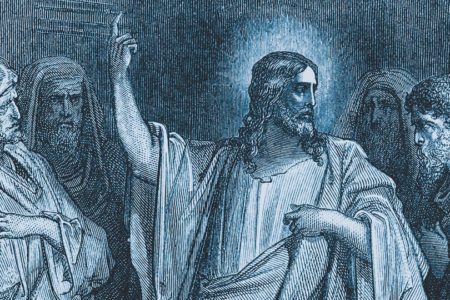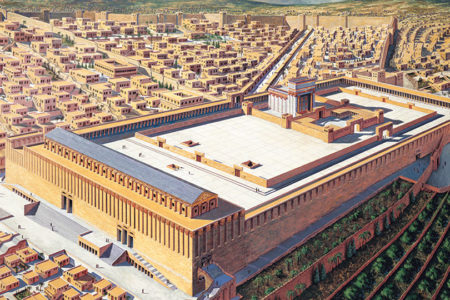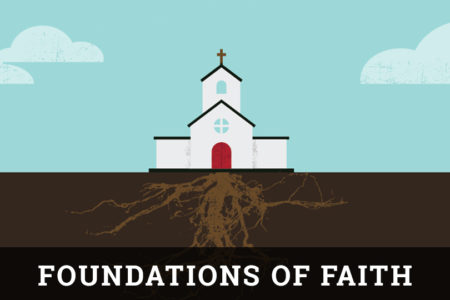The Fall of Babylon
Revelation 18
In the 1980s, Saddam Hussein started to rebuild portions of the ancient city of Babylon. Christians began to ask if Hussein’s project had anything to do with Bible prophecy. This in turn rekindled the often-asked question, “Did prophecy predict the rebuilding of Babylon?”
Conservative scholars differ on what the Bible teaches concerning Babylon’s future. Some teach that the city of Babylon will never be rebuilt for the following reasons. First, Isaiah predicted that “Babylon…shall be as when God overthrew Sodom and Gomorrah. It shall never be inhabited, neither shall it be dwelt in from generation to generation; neither shall the Arabian pitch tent there; neither shall the shepherds make their fold there” (Isa. 13:19–20). Second, Jeremiah predicted that no stone from the ruins of Babylon would be used to rebuild the city, and no one would dwell there (Jer. 51:26, 43). Third, in Revelation 17 and 18, the word Babylon is a symbolic description of a wicked religious, political, and commercial system, not a future rebuilt city.
The flip side for believing that Babylon will be rebuilt during the Tribulation is, first, Babylon was not suddenly and completely destroyed, as were the cities of Sodom and Gomorrah, nor did the city drink the last of God’s wrath when it was taken by the Medo-Persian Empire in 539 B.C. Second, the area is still inhabited, and stones from the old Babylon are being used to rebuild the city. Third, Israel and Judah did not reunite, flee the city, come to the Lord in tears, or find rest from sorrow and fear (Isa. 14:3–4; Jer. 50:4–5, 8) when Babylon was destroyed. These unfulfilled prophecies seem to indicate that Babylon will be rebuilt with a commercial system that will function on a worldwide scale.
Chapter 18 opens with John stating, “And after these things I saw another angel come down from heaven, having great power, and the earth was made bright with his glory” (v. 1). The phrase “And after these things” indicates that John received a new revelation about future events. The angel was given “great power” or authority to execute God’s judgment upon Babylon. His glory was so great that it illuminated the earth. The identity of the angel is not revealed, but he and his mission resemble the “mighty angel” mentioned in chapter 10.
Babylon Destroyed
Although Babylon’s destruction is yet future, in God’s eyes it is already accomplished. With a strong voice the angel cried, “Babylon the great is fallen, is fallen” (v. 2). Upon Babylon’s demise, she will “become the habitation of demons, and the hold of every foul spirit, and a cage of every unclean and hateful bird” (v. 2). This once-thriving city will become a wilderness, possessed with imprisoned evil spirits hovering over the area like scavenger birds over their prey.
One reason for the city’s fall is her decadent relationship with “all nations” described as “fornication” (v. 3). In the Tribulation, unbelievers, including kings and merchants (v. 3), will be wooed into a wicked union with Babylon and will become intoxicated with a passion for her wealth. Political and corporate leaders will have “grown rich through the abundance of her delicacies [luxuries]” (v. 3).
John “heard another voice from heaven” commanding true believers to “Come out” of Babylon so that they will not be “partakers of her sins” or “receive not of her plagues” (v. 4). They are to disassociate from this evil system of idolatry, luxury, and violence. Those who fail to do so will not be protected when God destroys the city. The same admonition was given to the Jewish people before the destruction of ancient Babylon (Jer. 50:4–8; 51:6, 45).
God will remember the spiritual and moral evil of Babylon and will judge her accordingly. Her sins have “reached unto heaven” (v. 5). The word reach means to glue or weld together—that is, pile one on top of another, as bricks in a building. This is an allusion to the tower of Babel, which began the wicked history of ancient Babylon (Gen. 11:5–9).* God will permit sin to increase until the cup is full; then He will act in divine judgment.
The angel calls for the law of retribution to be implemented against Babylon: “Reward her…double according to her works; in the cup which she hath filled fill to her double” (v. 6). Babylon’s cup, used to seduce others, will be filled with the undiluted wrath of God and used to destroy her. No mercy will be shown. God will measure out twice as much judgment on Babylon because of the enormity of her sin.
Another reason for the city’s fall is her pride of wealth: “she hath glorified herself, and lived luxuriously” (v. 7). This phrase “denotes a luxurious lifestyle with the accompanying trappings of discourtesy, arrogance, self-indulgence, ruthless exercise of strength, and unruliness.”* Her self-glorification will lead to self-sufficiency, self-deification, and finally self-deception. She will boast in her heart, “I sit a queen, and am no widow, and shall see no sorrow” (v. 7; cp. Isa. 47:8–11). However, just the opposite is true. She will be deceived and will suffer all the sorrow of widowhood.
Although the kings of the earth glorify her with praise, she will be forsaken by God. Her destruction will be sudden and complete. In “one day” she will suffer “death, and mourning, and famine, and she shall be utterly burned with fire” (v. 8; cp. vv. 10, 17, 19). In 539 B.C., although not destroyed as mentioned above, ancient Babylon was captured on the very night God prophesied her fall (Dan. 5).
Bewailing Dirge
A worldwide lament will rise from the earth dwellers as they see the smoke of Babylon’s destruction. First, monarchs “who have committed fornication and lived luxuriously with her” (v. 9) will bewail the city’s destruction. Afraid of being caught up in the same holocaust that consumed Babylon, these leaders are seen “Standing afar off for the fear of her torment” (v. 10). Their cry for the great city is, “Alas, alas [woe], that great city, Babylon, that might city! For in one hour is thy judgment come” (v. 10). The kings will wring their hands and weep over the loss of the power they enjoyed from participating in her wickedness and wealth. “They eulogize her with…praise, but there is a terrible hopelessness in their anguish; they marvel at the sudden destruction of that which they thought was gilt-edged security. They mourn as if lamenting the passing of a loved one.”*
Second, the merchants will mourn their loss, “for no man buyeth their merchandise any more” (v. 11). It would seem that doing business with Babylon will bring great riches to many people worldwide. These traders will profit enormously from doing business with Babylon. They will sell their souls to traffic in the items mentioned in verses 12–13: merchandise made of gold and silver and precious stones; beautiful purple and scarlet fabrics of fine linen and silk; household furnishings of thyine wood, vessels of ivory, precious wood, bronze, iron, and marble (v. 12); exquisite spices, perfumes, ointments, and incense; food items such as oil, flour, wheat, cattle, and sheep for human consumption; modes of transportation—“horses and chariots”—affordable only by the wealthy; a multitude of slaves, whom they own body and soul (v. 13). All of this opulence and wealth, which they will live and lust after, will depart in one hour and will be found no more (v. 14). The merchants will respond as did the monarchs to the loss of Babylon (v. 15). These merchants are the same ones spoken of earlier, who will take the mark of the beast so that they may buy and sell (13:17). They will be denied the same right they denied to others.
Third, mariners will mourn over their loss: “And every shipmaster…and sailors…cried when they saw the smoke of her burning, saying, What city is like unto this great city?” (vv. 17–18). Expressing great grief, as did those in Old Testament times, “they cast dust on their heads, and cried, weeping and wailing” (v. 19), echoing the lament of those mentioned earlier. Once again, “in one hour” (v. 19) all will be lost.
Believers’ Delight
In contrast to the monarchs, merchants, and mariners who lament the demise of Babylon, heaven, along with “holy apostles and prophets” (v. 20), will rejoice over Babylon’s destruction. They will rejoice because God, in His righteous judgment, “hath avenged” (v. 20) the blood of the saints. He will recompense Babylon with the same infliction she showed in martyring the saints (cp. 6:9–11).
A “mighty angel” appears for the third time in this chapter and takes “up a stone like a great millstone, and cast[s] it into the sea” (v. 21), symbolizing the sudden, swift, violent, total destruction of Babylon (cp. Jer. 51:61–64). The angel assures the world that Babylon “shall be found no more at all” (v. 21). The words “no more” are mentioned seven times in this chapter. No more will all the things mentioned in verses 12 through 14 be found in Babylon, along with the “voice of harpers, and minstrels, and flute players, and trumpeters…craftsman…the sound of a millstone …light of a lamp…the voice of the bridegroom and of the bride” (vv. 22–23). Of the nine items mentioned above, seven are described as “the voice of.” When God destroys Babylon, sounds of life will cease to exist in any form. This will be a testimony to her total destruction, like that of Sodom and Gomorrah.
The enormity of Babylon’s great sin, which will precipitate her demise, is once again mentioned in the closing verses of this chapter. First, her merchants, “the great men of the earth” (v. 23), will not only be responsible for exporting their products worldwide, but the diabolical Babylonian system as well. Second, “by thy sorceries were all nations deceived” (v. 23). Babylon will use pseudo-magical arts to deceive all nations during the Tribulation and lure them into an immoral spiritual relationship with herself.* A third reason for Babylon’s destruction is that “the blood of prophets, and of saints, and of all that were slain upon the earth” will be found in her (v. 24; cp. Jer. 51:35–36, 49). During the Tribulation, Babylon will not be the only one responsible for the martyrdom of prophets and saints. Her aggressive hatred for true believers will be transmitted worldwide as she inspires governments to martyr saints.
Linkage with the Babylonian system is traced back to Genesis. Its demonic influence is threaded all through Scripture, touching every major area of human existence. Politically, Babylon symbolizes prideful rebellion against God. By trying to build a tower to heaven, Nimrod attempted to confederate the people into a city-state that would receive worldwide fame and recognition. This was in direct defiance of God’s command to “multiply, and fill the earth” (Gen. 9:1). God destroyed this program by confusing their language and scattering the people. Religiously, Babylon symbolizes the mother of idolatrous religion and worship that has infected all nations with its satanic dogma and practice. Economically, Babylon symbolizes the pride of wealth and sensuality; the worship of money, power, and prosperity; the spirit of covetous commercialism that dominates worldwide commerce. All of this will be destroyed at the Second Coming of Christ. The phrase “Babylon…shall be found no more” (v. 21) says it all.







Enjoyed reading your message, which I personally believe is very soon to be fulfilled. What Nimrod started has carried on down thru generations, but soon will be destroyed by Yehoshua (Jesus)forever. Will the Babylon city be rebuilt as in materialism as in the past as some teach or is it a system, false doctrines, etc that will be destroyed? We don’t hear much preaching of Revelation anymore and many seem to be unconcerned about the matters that are going to be fulfilled, but we know all prophecy will be fulfilled. Again enjoyed reading your article and may the GOOD LORD BLESS YOU. Myself I’m just trying to grow spiritually daily trying again more knowledge of the truth. Thanks